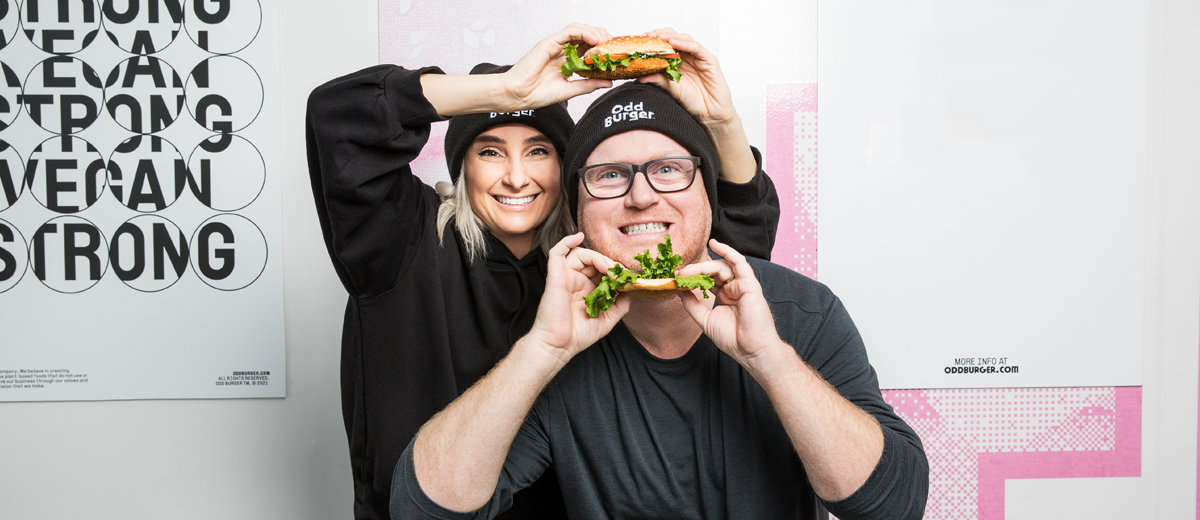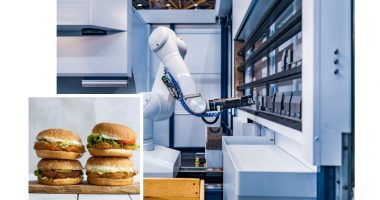Certain companies are destined to usher their industries into the future through innovation and the continual improvement of their customers’ lives.
The Market Herald Canada’s Leading Edge introduces you to those companies with a focus on how business is evolving toward the interests of society.
Next up: Odd Burger (ODD).
Origins
Odd Burger is one of the world’s first vegan fast-food chains and the world’s first to be publicly traded.
It was founded by COO Vasiliki McInnes and CEO James McInnes to offer fast food that is environmentally sustainable, free of animal harm and priced comparably to major fast-food chains.
James first entered the market in 2014 with a grassroots vegan organization delivering organic fruit and vegetables from local farmers to your door. Vasiliki came on board the following year when the couple introduced their vegan meal kits to widespread customer acclaim.
In 2016, Odd Burger debuted its plant-based Big Mac homage, the Famous Burger, at Ribfest in London, Ontario, where it sold out and garnered considerable media attention throughout North America. This attention led to the launch of a food truck, which enabled the brand to build word-of-mouth in a growing number of Ontario communities.
In 2017, the company opened its doors as Canada’s first vegan fast-food restaurant. It then added a manufacturing facility in London in 2018, where research and development are constantly taking place to expand its over 30 plant-based products.
Besides supplying franchised restaurants, the facility offers packaged products to select clients under the Preposterous brand through an exclusive food service distribution partnership with Sysco. Preposterous manufactures 13 proteins and 8 sauces and dressings – all of which are available in Odd Burger restaurants – using minimally processed ingredients, including chickpeas, wheat, oats and beans.
Odd Burger’s meals are best described as healthier fast food. They’re free of cholesterol and growth hormones and contain more fibre and less saturated fat than animal-based competitors, though there are similarities in terms of calorie and sodium content.
“It’s part of being in the category; it’s gotta taste good,” James commented, referring to Odd Burger’s commitment to flavour and indulgence without the guilt commonly associated with a trip to the drive-thru.
The company’s patties are prepared with wheat gluten, chickpeas, onion and flax, while its breakfast options use tofu instead of egg. Its ‘bac-un’ is made with tempeh, a type of fermented soybean. Its ice cream and shakes are prepared with coconut milk. Each recipe is also developed in-house, which should facilitate the company’s ambitious expansion plans.
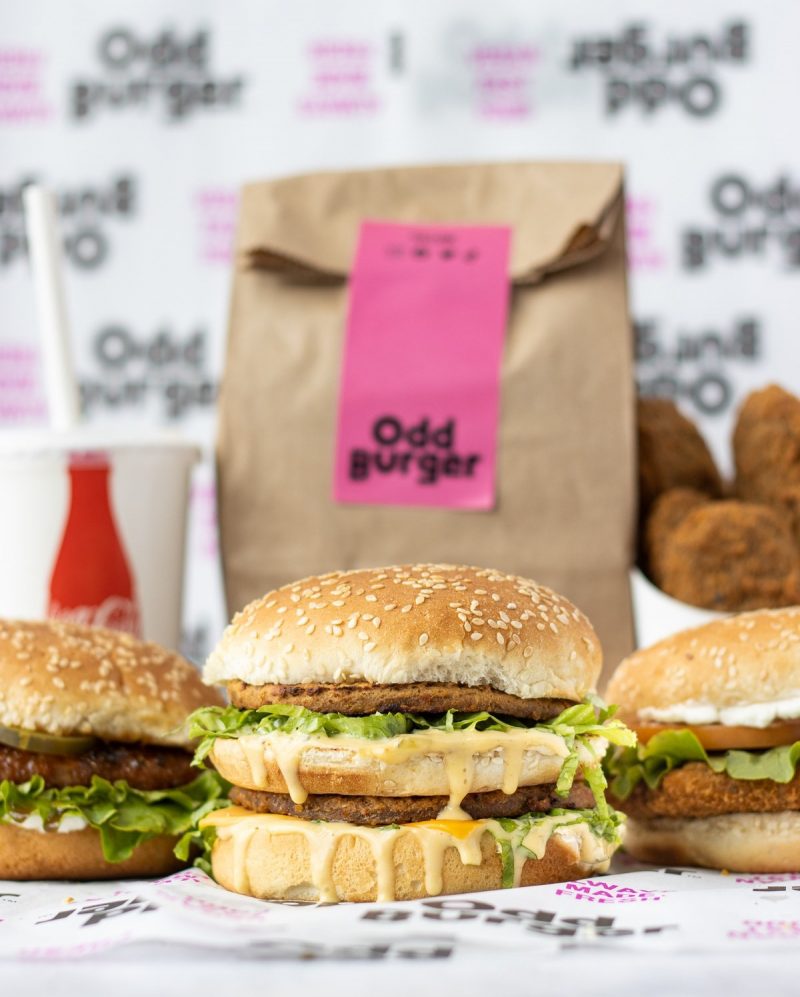
To date, Odd Burger has 92 locations operational or under an area development agreement. This includes 7 locations presently operational, all in Ontario, and 50 locations projected to be operational or actively under development across Canada in 2023.
The company’s mission is to disrupt the fast-food industry by offering delicious food that is both better for you and the planet compared to the existing marketplace. It is fulfilling that mission through a differentiated growth strategy based on automation technology, vertical integration and locally sourced ingredients underpinned by vegan values and community involvement.
Differentiator
According to Meticulous Market Research, the plant-based food market is expected to be worth US$74.2 billion by 2027, growing at a CAGR of 11.9 per cent from 2020.
Annual global sales of plant-based meat alternatives have grown on average 8 per cent per year since 2010, with projections forecasting that 25 years from now, 20 per cent of meat will be clean or plant-based (National Research Council of Canada, 2019).
According to Research & Markets, the global fast-food market is expected to
reach US$931.7 billion by 2027, rising at a CAGR of 4.6 per cent from 2020 to 2027.
Additionally, a 2018 study by Dalhousie University showed that almost 10 per cent of Canadians identify as vegans and vegetarians, with a 2020 VegFAQs study finding that vegans in Canada doubled between 2018-2020.
These figures begin to capture the size of Odd Burger’s addressable market and its considerable investment potential if it can achieve scale in an efficient, cost-conscious fashion. Luckily for investors, current and prospective, the company has a detailed view of its path forward.
Technology is the main catalyst for Odd Burger’s growth strategy. Restaurant kitchens, for one, are largely automated, with cooking occurring based on pre-set timers. This approach encourages consistency and freshness while minimizing waste to keep prices low. Restaurants are also set up to maximize orders and streamline wait times through an exclusively cashless self-checkout system.
Most impressive of all, Odd Burger will soon outfit locations with proprietary automation technology, which will allow for reduced food prep times and greater meal customization. The design phase is now complete, with prototyping underway.
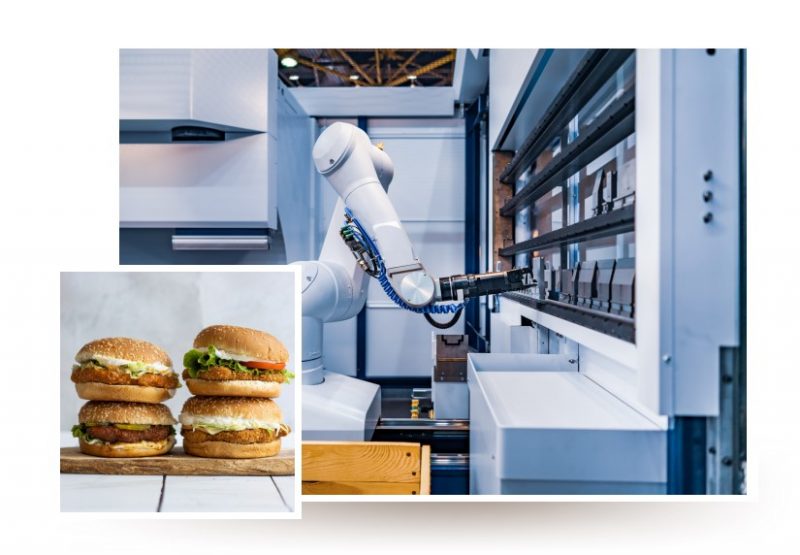
With productivity optimized, management made sure to design a compact store under 1,200 sq. feet, which enables a pandemic-proof takeout and delivery model and widens the opportunity set of potential franchisees.
Interested entrepreneurs must have liquid cash of at least C$150,000 and a net worth of C$300,000 to qualify, with each restaurant ranging between C$500,000-C$800,000 all-in depending on location and size.
With its sights set on vertical integration, the company currently manufactures 65 per cent of all food sold in its restaurants, with that number set to increase substantially over the next few years. In July, it announced the purchase of 5.5 acres in London, Ontario, for a new 50,000 sq. ft. facility with a potential expansion of up to 150,000 sq. ft. Construction is estimated to take 1-2 years after permit approval.
The extra production capacity will supply hundreds of future restaurants and allow for the launch of a retail line in grocery stores as well.
From a management perspective, Odd Burger’s entrance into the plant-based food category is backed by founder ownership of 52 per cent and board members with expertise fit to catalyze growth. Board member Ted Sehl, for example, was Director of Finance at
McDonald’s Restaurants of Canada for 11 years, while Michael Fricker, currently CFO at
Reunion Foods and Qvella Corporation previously served as CFO at Bento Sushi, North America’s second-largest sushi brand with over 900 franchised locations.
Surrounding Odd Burger’s technological savvy and aligned management team is its commitment to organizations that share its love for animals or otherwise put social consciousness into practice to benefit the world. Donations in 2020 and 2021 include The Save Movement, Black Lives Matter Canada, Dara Farm Sanctuary, and Food Not Bombs, with more names soon to follow.
With a robust plan to gain market share underway, we’ll now take a closer look at the company’s financial health and what it reveals about investment prospects moving forward.
Finances
Let’s narrow down the picture of who Odd Burger is trying to reach.
According to the company’s in-house review of the plant-based food industry (August 2022), plant-based meat commanded a 1.4-per-cent share of the total U.S. meat market in 2021, with sales of US$1.4 billion. However, the category grew by 74 per cent between 2018 and 2021 and nearly tripled in size during the period compared to the conventional meat market.
According to the National Research Council of Canada, our own market for plant-based proteins is projected to grow at 14 per cent per year by 2024. This represents up to a third of Canada’s overall protein market, which may seem high until we consider that 40 per cent of Canadians practice flexitarian eating habits driven by population growth, health benefits and environmental stewardship. This makes Canada an ideal population for Odd Burger to introduce itself to the world and establish a presence before pursuing U.S. expansion.
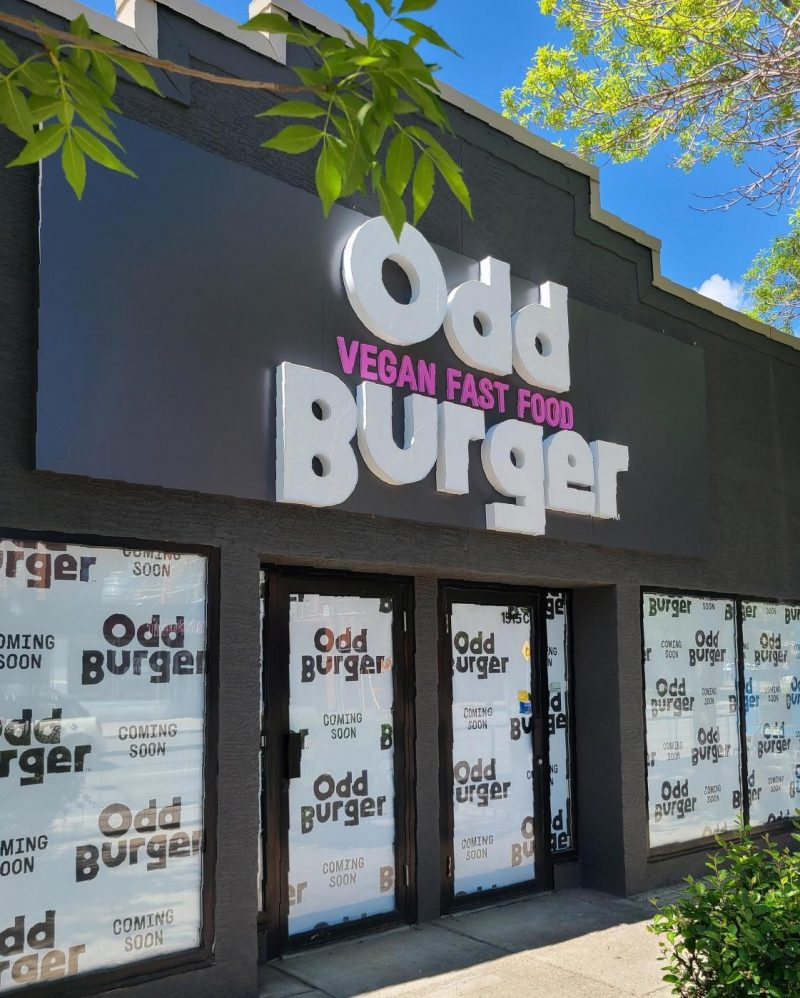
To keep cash flows consistent as it rolls out new restaurants and rides the plant-based wave, the company benefits from three sources of revenue:
- Franchise revenue, which includes a C$35,000 franchise fee, an annual royalty of 5 per cent of gross sales, plus an annual advertising fund contribution of 2.5 per cent
- Corporate restaurant revenue, which is comprised of direct-to-consumer sales
- Preposterous revenue, which includes food sales to franchised restaurants as well as external restaurants and institutions
When it comes to actual performance, Odd Burger reported all-time record quarterly revenue of C$787,585 in Q3 FY2022 (fiscal year ends September 30th), which is up 205 per cent YoY and up 23 per cent QoQ. Revenue is also up 175 per cent YoY for the nine months ended June 30, 2022.
Gross margin for the same nine-month period increased by C$372,383 YoY, while it rose to C$277,904 in Q3 FY2022 versus C$(17,996) in Q3 FY2021. The company attributes the improvement to restaurant expansion and increased efficiencies at Preposterous Foods.
This focus on growth without waste, driven by its lean business model tailored to the UberEats and Door Dash generation, allowed the company to post its lowest quarterly loss since going public. The figure improved 73 per cent from Q3 FY2021 and 6 per cent QoQ to C$(938,552).
While a negative number may make certain investors uneasy, Odd Burger benefits from numerous factors that lend credence to its improving performance. These include:
- Prudence with debt, which is covered 1.53x by total assets
- Modestly sized restaurants, which counteract generationally high Canadian real estate prices
- Minimal staffing needs to minimize ongoing costs
- An approachable brand, in line with a global shift in environmental consciousness, that is already taking hold in its space given the almost 100 locations under contract
Another major key underlying Odd Burger’s path to profitability is the planning enabled by having firm area representative agreements in place. It has signed such agreements for Ontario, Alberta and B.C. to bring on 76 franchises over the next seven to eight years.
Representatives are under contract to open a minimum number of restaurants per year, offering Odd Burger predictable growth targets to control spending and manufacturing capacity and investors a reliable means to construct valuation models to substantiate an allocation.
The agreements also establish financial incentives for representatives to sell franchises in prospective locations, maintain brand standards and provide ongoing support to franchisees.
To end, we’ll delineate a few central drivers of the company’s future success.
On the horizon
Odd Burger plans to finance operating costs over the next year with cash on hand, equity and debt issuance, and the sale of certain corporate locations to franchisees. It expects to raise gross proceeds of C$3 million from these transactions.
As the company grows, this upfront spending should become available at more favourable rates, paving the way for its efficiency-first approach to accelerate the reaching of scale.
It believes near-term growth will come primarily from onboarding more franchisees as Preposterous customers, leading to increased recurring revenue to fund initiatives toward fully-fledged vertical integration.
Odd Burger’s path to profitability and self-sufficiency is then a question of brand loyalty. In other words, while fast-food and plant-based appetites are growing exponentially, as we have seen, and the company operates in a streamlined fashion with its heart on its sleeve, will these two facts merge into durable competitive advantages that generate long-term shareholder value?
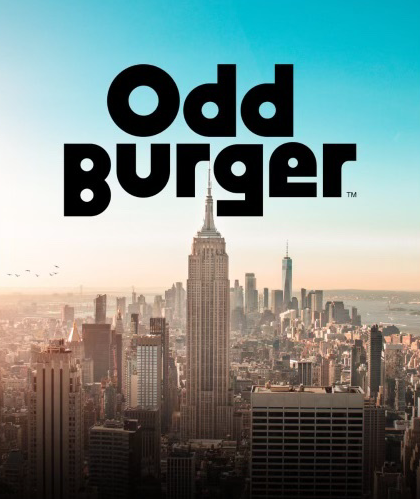
While there are no crystal balls to consult for a definitive answer, Odd Burger finds itself on the right side of history with a business plan clearly set up for success.
The company has already received interest from hundreds of potential U.S. franchisees, prompting it to form a Delaware corporation to operate its U.S. franchise division. It has also finalized a U.S. franchise agreement and disclosure document and placed boots on the ground to scout for a flagship Manhattan location.
It intends to sell franchises in an initial 25 states, including Colorado, Arizona and Nevada, with more to follow upon completion of regulatory filings. Similar to Canada, the company is developing area representative and area development programs to accelerate U.S. growth as predictably as possible.
As for its Preposterous manufacturing subsidiary, Odd Burger plans to leverage its partnership with Sysco to potentially onboard some of the distributor’s 600,000 global food service customers and 330 global distribution centers. This strategy has the potential to minimize seasonal fluctuations in restaurant revenue, as well as facilitate regular reinvestment in business innovation without shareholder dilution.
In the near term, investors should pay close attention to quarterly results as new restaurants become operational. Positive signals to look out for include improving margins and inventory turnover, the closing gap between operating capital and operating costs, and an increasing sense of brand ubiquity, whether at the grocery store or out on the town, all of which should produce a margin of safety as Odd Burger vies to become the household name in vegan fast-food.

